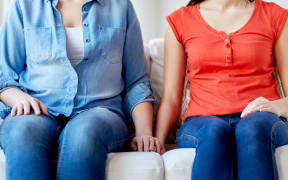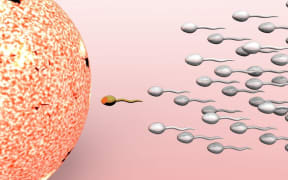By Amy Nelmes Bissett
Why are New Zealand women eschewing fertility clinics and looking for sperm donors online? And why are Kiwi men donating to strangers they meet on Facebook groups? Amy Nelmes Bissett uncovers a world of hope and risk.

Melissa Maynard almost gave up on having children, then she found a sperm donor online. Photo: RNZ / Dan Cook
The two-bedroom flat in South Auckland's East Tamaki could rival a daycare centre: there's box-upon-box of brightly coloured toys and books, a Jolly Jumper and a bouncer complete with a clip-on activity table emblazoned with cartoon animals. But 6-month-old Emerson is more interested in his mum Melissa Maynard, 33. He watches her closely as she explains all the kid's paraphernalia: "That's the joys of being the last in your friendship group to have a baby - you get all the great cast-offs."
Only last year, Maynard, who works in finance at Auckland Museum, doubted she'd have children. She faced a dilemma: at 32 years old, she could settle for Mr Not-So-Right in order to have a baby or get on with accepting that it might just never happen. Then she stumbled upon what appeared to be a tidy solution to a difficult problem - pregnancy via donor sperm. Or more accurately, a DIY sperm donor baby, created at home with sperm found with a few clicks on the internet.
"I put a post up on one of the women's group Facebook pages, saying how I felt that being a mum might not be in my future and someone reached out to me and said there's other options out there. She was pregnant by a private donor. I thought about it and it felt like the right thing to do. I'd always been a do-it-myself-type of girl. Very independent. And I've always felt perfectly happy by myself."
Fertility clinics say about a decade ago it was straight couples struggling with fertility issues and same-sex couples who used donor sperm to have babies. But by 2014 women going it alone accounted for more than half of the 300 babies born in New Zealand with the help of donor sperm accessed through fertility clinics. It's this, in part, that has led to one of New Zealand's biggest sperm shortages since sperm banks were established in the country in the 1970s: there's currently an 18-month to two-year wait.
But some single New Zealand women aren't willing to wait. They've discovered that while clinics are running at almost dry, there's small pockets of the internet awash with willing swimmers. There are Facebook groups, specialised websites and forums populated by New Zealand men willing to create the next generation of "turkey baster babies", as Maynard puts it, and who are happy to do so without any monetary reward.
International site coparents.com has 100,000 registered members, and this is where Melissa found her self-styled Samaritan - a married 37-year-old professional who decided to become a donor after a few of his female friends had fertility issues. There's also the NZ Sperm Donors forum, with 492 members, and Facebook groups such as Sperm Donation NZ and Egg and Sperm Donors NZ, which has been attracting 10 new members a week since the start of the year.
Their growing popularity is likely partly down to the cost of trying to conceive with the help of a fertility clinic. It was certainly a factor for Maynard. "If the only option was to go through a fertility clinic, then financially I wouldn't have been able to do it."
But she did do it. "Turning up at his house that first time, it was so awkward. It's hardly a fun way to create a baby." Still, within two menstrual cycles she was pregnant.
The risk of half-siblings becoming romantically involved
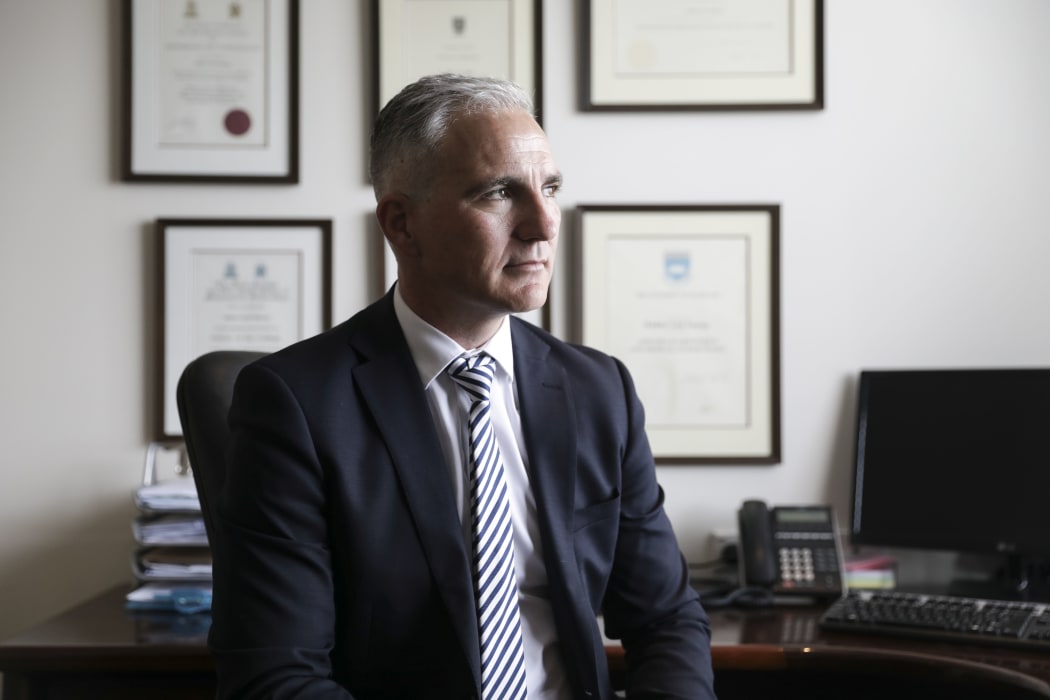
Dr Andrew Murray, medical director at Fertility Associates, says the biggest risk in the "shoot first and think later" private donor world is future incest. Photo: RNZ / Rebekah Parsons-King
The 'turkey baster method' is old, simple and as likely to result in pregnancy as sex. Despite the name, women no longer use turkey basters but needle-free syringes that can be bought over-the-counter. The syringe is filled with sperm and released close to the cervix.
Some sperm donors visit a woman's home, taking a time-out in the bathroom and returning with a small medicine jar. Others ask to be visited at home or at a hotel. But, Maynard says, some donations are made in more public surroundings. "You hear stories about people meeting at McDonalds to hand over their donation."
But this burgeoning method of baby-making comes with risks. "There's plenty of guys who don't want to do it artificially," says Maynard. "I had a few of those contact me, telling me it will work better. But the women in these groups look out for each other. We know the red flags."
Still, personal safety issues aside, the unregulated donor industry leaves women, children and donors open to a quagmire of issues that range from medical to legal and ethical.
Since August 2005, the Human Assisted Reproductive Technology Act 2004 has dictated that all sperm donors must be identifiable. Experts stress that children who do not know the identity or background of their biological parents can struggle with feeling incomplete. In the unregulated world of online sperm donors, there's no one ensuring the law is followed. In fact, with no governing body or database recording donors matched with women online, there is no way of knowing how many babies are even created this way. And what happens if a mother decides to seek financial support from a donor she met online? Or if a donor decides he wants to be an integral part of a baby's life?
Medical Director of Fertility Associates, Wellington, Andrew Murray, says these are all big risks in the "shoot first and think later" private donor world, but, he says, the most worrying issue is the increased risk of "consanguinity".
"When a clinic is doing the sperm donations, we limit the amount of children from a single donor," he says. "A single donor can donate to up to five different families and we limit the number of children to 12 in total. And this is to reduce the small chance that half-siblings might unwittingly pair up in later life. If you have been conceived through a clinic, we generally encourage that it's an open disclosure situation."
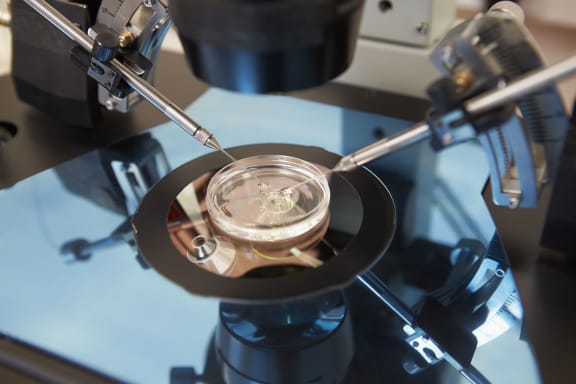
The cost puts some women off using a fertility clinic. Photo: 123RF
Murray is aware the cost of finding a donor through a fertility clinic is an issue. Fertility Associates charges $300 for an initial consultation, then a donor's testing costs $1500. Simple artificial insemination is $1500 per cycle, or a more specialised fertility approach, perhaps with IVF or fertility drugs, can cost up to $14,000 a cycle.
But, he says, the cost eradicates the risks. All donated sperm is tested for genetic and medical issues and quarantined for three months before it is tested again for the likes of STIs, infections such as AIDS and hepatitis, and life-long issues, including cystic fibrosis. "You don't know the medical history if you're going through Facebook. You're relying on those donors being upfront with you about what they choose to tell you."
Murray says that clinics also offer counselling to all parties and that donors are legally obliged to be contactable by the child when they turn 18.
'They basically have got what they want and want nothing to do with me'
Christchurch pre-school teacher Clare Fahey runs Facebook group Sperm Donation NZ and says the prospect of never having your own child outweighs the risks of finding your own donor. Besides, women in the group work hard to combat the many risks, she says.
Fahey, 37, is heavily pregnant with twins conceived with the help of a donor she found online. She says she's yet to meet a woman who didn't draw up a contract to be signed by her donor. She says women also ask their donors to take STI tests and medicals.
"I started the group as I'm single and decided that I wasn't willing to wait any longer to meet the right man," Fahey says. "I wanted to find a donor for myself, which I did. But now it's about helping others out there to find donors. Every week, the members are growing and that really shows that more and more single women are looking at this as an option."
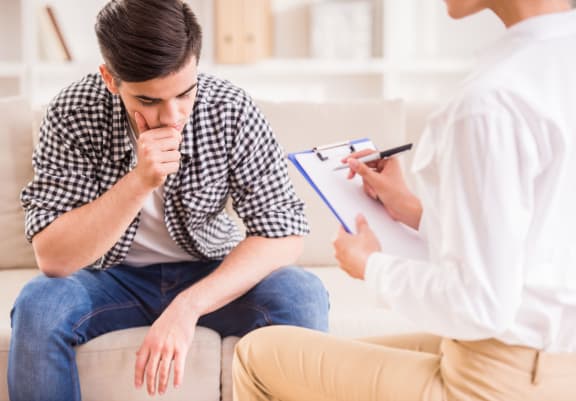
Sperm donor Seth Wayne says he wants to help women, but doesn't want to go through a clinic's consultation and counselling. Photo: vadimgozhda/123RF
Online groups are making their way into the real world too, with coffee groups now meeting in cities across New Zealand, so women can support each other, share stories of their journey and bring their babies, conceived with donor sperm, to play with one another.
But where are the men in all this? What prompts New Zealand blokes to shun clinics in favour of handing over sperm to strangers they meet on Facebook? "The clinics, they just don't simplify the process," private donor Seth Wayne says. "The donor has a life too. If I go through a clinic, I have to do a consultation and therapy and it takes six months to help one person. It's too much."
Wayne, 28, who lives in Melbourne, put a shout-out on the Facebook group Eggs and Sperm Donors - New Zealand in July, telling the 350 members that he would be travelling around the South Island on holiday in September and was willing to help anyone along the way. He ended up donating to two women - handing over a small tub of semen to each - during his road trip. It's the second time Wayne, who has a masters in accounting, has donated - he also offered up his sperm while visiting Auckland at the beginning of the year.
His drive? His sister has fertility issues. "I felt sorry for my sister so I thought, 'Why not try and help someone?' I read an article about being a sperm donor and did some research and here I am, a donor.
"I've donated to many women but only one confirmed pregnancy, but three have vanished so there could be more. And that does upset me. I think it's important to keep in contact."
"Tony Tauranga" claims he's New Zealand's biggest donor but does not want to be identified by his real name. The 42-year-old is a divorced dad to two adult children and says he's fathered 20-plus children across New Zealand. He tells a similar story to Wayne. "About half are really good and treat me as part of the family and tell the kids who I am. We have a yearly coffee and just seeing the joy from my actions is very rewarding. The other half are the bad side and basically have got what they want and want nothing to do with me."
The issues - for donors, mothers and children - are bound to continue and even grow. DIY donor babies are a growing phenomenon and their conception is impossible to regulate. But as Dr Andrew Murray points out, we probably shouldn't even be trying to. "We don't regulate couples when they choose to have sex and I suppose what people do in the privacy of their own home is their own business. But it's about being educated about what the risks are and really, remembering that the most important person in all of this is the child."
* An earlier version of this story stated that IVF can cost up to $40,000 a cycle. This has been corrected to $14,000.
